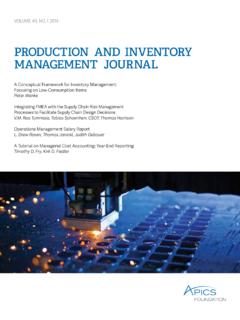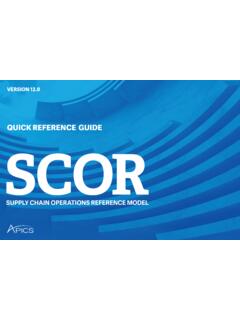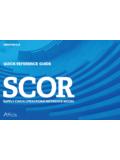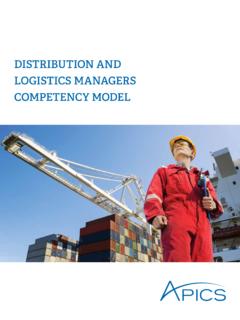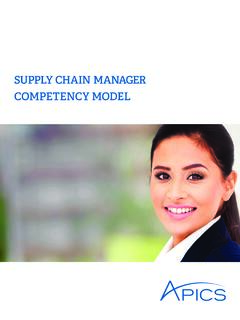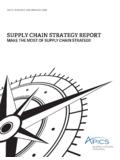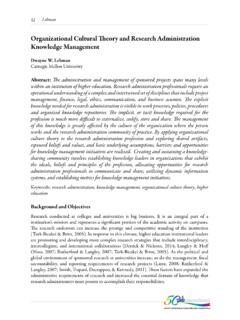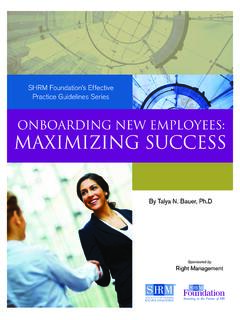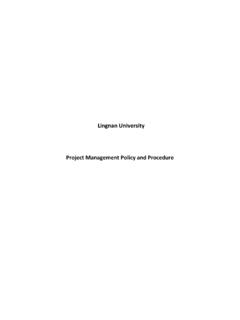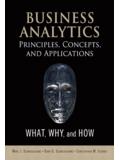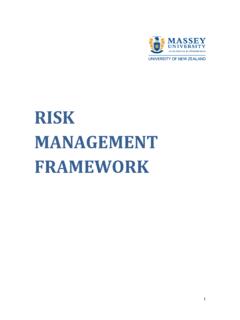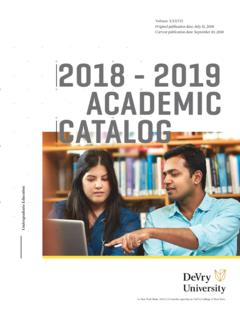Transcription of BUYER/PLANNER COMPETENCY MODEL
1 BUYER/PLANNER . COMPETENCY MODEL . INTRODUCTION. Buyer/planners are buyers who also do material planning. This role is responsible for and manages purchasing, materials requirements planning, supplier relationship management , product life cycle and service design, among other things. APICS is the premier membership organization that provides education, certification and career development opportunities to supply chain professionals worldwide. The APICS Certified in Production and Inventory management coursework and corresponding certification give professionals the knowledge and skills they need to succeed. Knowledge and skills, combined with professional experience, create the competencies required for individuals to excel in their careers and distinguish themselves in their field.
2 APICS developed the BUYER/PLANNER COMPETENCY MODEL to guide individuals considering careers in buying and planning for BUYER/PLANNER professionals seeking to advance their positions and human resource managers who are hiring in this field. 2 APICS BUYER/PLANNER . SUSTAINABLE CAREER. SUPPLY CHAINS: PACK VALUE THE PRIORITY. MAKING. ABOUT THE MODEL . The structure of the APICS BUYER/PLANNER COMPETENCY MODEL follows guidelines set by the Employment and Training Administration of the United States Department of Labor. The MODEL is represented in a diagram on the next page for easy reference. The MODEL is organized into tiers of competencies, with descriptions of the activities and behaviors associated with each COMPETENCY . The COMPETENCY MODEL Clearinghouse defines COMPETENCY as the capability to apply or use a set of related knowledge, skills, and abilities required to successfully perform critical work functions'.
3 Or tasks in a defined work setting. In most cases, the competencies outlined in this MODEL are adapted from the APICS Operations management Body of Knowledge (OMBOK) Framework. ACKNOWLEDGMENTS. The APICS BUYER/PLANNER Manager COMPETENCY MODEL was a research project undertaken by staff in the Professional Development Division of APICS. They were supported by APICS members and customers who participated in survey research. APICS staff used public domain information obtained from the COMPETENCY MODEL Clearinghouse ( ) to create the MODEL . 3 APICS BUYER/PLANNER CAREER PACK. BUYER/PLANNER DIAGRAM. Occupation-related BUYER/PLANNER Specific Requirements includes requirements such as certification, licensure and specialized educational degrees, or physical and training requirements for buyers/planners.
4 Postsecondary education Association membership Certifications BUYER/PLANNER Knowledge Areas and Technical Competencies represent the knowledge, skills and abilities needed by buyers/planners. Purchasing Inventory management Scheduling techniques Risk management Material requirements planning Supplier relationship management Profession-related Product and service design Enterprise resources planning and Service scheduling (days on and days off) manufacturing resource planning Plant maintenance Advanced planning systems Operations management Knowledge Areas and Technical Competencies represent the knowledge, skills and abilities needed by all occupations within operations management , including buyers/planners. Operations strategy Execution, planning, scheduling control Manufacturing process environments Lean management Standards (time measurement) Sustainability Supply chain management Enabling technology application Process improvement and six sigma Workplace and Leadership Competencies represent those skills and abilities that allow individuals to function in an organizational setting.
5 Problem solving and decision making Planning and organizing Teamwork and collaboration Conflict management Accountability and responsibility Supporting and training staff Customer focus (internal and external). academic Competencies Foundational are primarily learned in an academic setting, and include cognitive functions and thinking styles. Math, statistics and analytical thinking Foundations of business management Reading and writing for comprehension Materials management fundamentals applied science and technology Operations and enterprise economics Supply chain fundamentals Personal Effectiveness Competencies represent motives and traits as well as interpersonal and self- management styles and generally are applicable to a number of industries at a national level.
6 Awareness of the needs of others Effective communication Integrity Interpersonal skills Continuous learning Creativity 4 APICS BUYER/PLANNER CAREER PACK. FOUNDATIONAL. COMPETENCIES. PERSONAL EFFECTIVENESS COMPETENCIES (TIER 1). Personal effectiveness competencies represent motives, traits, and interpersonal and self- management styles, and are applicable in any number of industries. Awareness of the needs of others Understand other business needs and goals. Have perspective into other points of view. Build rapport and credibility with colleagues. Anticipate needs and respond to concerns and conflicts. Integrity Demonstrate trustworthiness and professionalism with clients, peers and team members. Respond with consistency in situations that require honesty and candor.
7 Avoid conflicts between work and personal interests or activities. Continuous learning Demonstrate an interest in personal learning and development; seek feedback from multiple sources about how to improve and develop; modify behavior based on feedback or self-analysis of past mistakes. Take steps to develop and maintain the knowledge, skills and expertise necessary to achieve positive results; participate fully in relevant training programs; actively pursue other opportunities to develop knowledge and skills. Anticipate changes in work demands and participate in assignments or training that address these changing demands; treat unexpected circumstances as opportunities to learn. Engage in career development by identifying occupational interests, strengths, options and opportunities; make insightful career planning decisions based on integration and feedback; seek out additional training to pursue career goals.
8 5 APICS BUYER/PLANNER CAREER PACK. Effective communication Express information to individuals or groups that considers the audience and the nature of the information (for example, technical or controversial);. speak clearly and confidently; organize information logically; speak using English conventions including proper grammar, tone and pace; track and react appropriately to audience responses; use eye contact and nonverbal expression effectively. Receive, attend to, interpret, understand and respond to verbal messages and other cues; pick out important information in verbal messages;. understand complex instructions; appreciate the feelings and concerns behind verbal messages. Practice meaningful two-way communication by speaking clearly, paying attention, seeking to understand others, listening attentively, clarifying information and attending to nonverbal cues; respond appropriately.
9 Influence others; persuasively present thoughts and ideas; inspire commitment and ensure support for ideas. Interpersonal skills Relate to clients, colleagues and team members. Maintain a positive, supportive and appreciative attitude. Actively listen to others and demonstrate understanding of different points of view. Create an open environment that encourages people to work together to solve problems and improve practices and services. Explore and resolve conflicts as they arise. Communicate clearly to avoid misunderstanding. Creativity Demonstrate intellectual curiosity about why things are the way they are;. challenge the status quo. Change, elaborate, adapt and improve on ideas or those of others. Demonstrate a tendency toward action; materialize thoughts into products or services.
10 6 APICS BUYER/PLANNER CAREER PACK. academic COMPETENCIES (TIER 2). academic competencies are primarily achieved in an academic setting and include cognitive functions and thought processes. Math, statistics and analytical thinking Practice applied mathematics in collecting and interpreting quantitative data. Demonstrate the ability to scrutinize and break down facts and thoughts into strengths and weaknesses. Develop the capacity to think in a careful and discerning way to solve problems, to analyze data, and to recall and apply information. Reading and writing for comprehension Understand what has been read; gather information from a text. Demonstrate an understanding of material read by forming opinions and sharing personal experiences. Apply the strategies of self-questioning, retelling, writing, summarizing, predicting and verifying, story mapping, role play and responsiveness.
